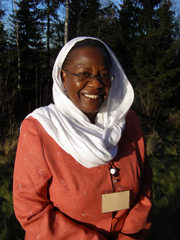Speech on AMEN by Maimuna Mwidau
 |
 |
 |
Maimuna Mwidau, Secretary General of AMEN |
A presentation by Maimuna Mwidau, Executive Director of the League of Muslim Women of Kenya, and Secretary General of the Africa Muslim Environment Network (AMEN) - at the Oslo Conference co-hosted by ARC in November 2006.
As you may all be aware, political or geographical boundaries are the sources of many conflicts and the ever rising cases of border insurgency, regional feudalism and hatred among communities, but according to the Islamic perspective, a community is not necessarily people living within a given geographical area or with a certain ethnic background. It is more to do with people who profess the same faith, whose interests, beliefs and aspirations transcend their cultural, national, racial and continental differences.
In Sub Saharan Africa there is a co-relation between religion, culture and society - that has greatly influenced what happens in both the urban and the rural setting. A distinctive feature of traditional African religion has demonstrated a way of life, whose purpose is to foster cordial relationships amongst humans, with a view of harmonizing the environment, spirit, nature and society.
Africa is the poorest continent in the world. Poverty levels continue to surge even as we sit here today.
The poorest of the poor in Africa are Muslims who are in dire need of basic necessities like food, decent housing, water, healthcare, education and security. It is their lack of such basic necessities that prompted founders of AMEN, which I am representing today, to establish a network that would connect Muslim groups in Africa with secular ones. AMEN is also keen to disseminate crucial information to members on environment and spirituality.
So far, the network has made substantial progress in having membership in Kenya, Tanzania, Zambia, Zimbabwe, South Africa and is still spreading its tentacles. We intend to facilitate the launch of viable developmental projects – with the intention of relinquishing management to local communities, with AMEN monitoring and evaluating them periodically. Up to now Mosques have usually only been concerned with theological, pastoral and spiritual matters, but AMEN has gone an extra mile in encouraging imams to tackle socio-economic issues as well.
In the West, religion and culture tend to remain personal matters, but in Africa they are more complex and public. For instance weddings, funerals or even births are a collective responsibility in Africa, rather than something just for immediate family.
I’d like to give you an example from the Mijikenda and the Maasai communities in Kenya. In Swahili “miji” means settlements and “kenda” means nine. So the mijikenda were nine communities or sub-tribes living together in small enclosures called kayas, and epitomising brotherhood, sisterhood and solidarity. Recently most of these mijikendas have shifted their economic activities mainly from pastoralism to modern farming like poultry keeping, or textiles, metal work and sculpture.
The Maasai too, legendary pastoralists with no written heritage, have managed to pass on some of their coveted virtues and wisdom through tales, proverbs, riddles and songs. They also value humane virtues like generosity, truth, humility and are proud of their unique culture whose greatest challenge today is the brain drain to the cities.
On Cultural Understanding
A three stage rite of passage is practised throughout much of African culture. It begins with birth, then initiation and circumcision for boys aged between the age of 12 to 14 years. Some cultures also practise criteridectomy, the now infamous female genital mutilation, touted as a grevious human rights violation against girls. But it is gradually scaling down and AMEN is also making concerted efforts to sensitize local communities on the repercussions.
In the book Wild Law the author Cormac Cullinan argues that the socio-economic crises facing African states are a direct consequence of poor governance and lack of understanding of our cultures. He goes on to state that the world can only dream of positive change if it embraces practices that honour the earth community - which brings me to the Muslim Criteria.
The Muslim Criteria for projects
In February 2005, Muslim leaders in Africa held an Afroasian conference in Mombasa that discussed the Islamic criteria in depth. Among the key issues that emerged was the nature of partnership between Western and Islamic cultures with a sense of mutual learning, challenge and acceptance.
1. Respect. It was unanimously agreed that the respect for Islamic teachings be a common denominator in every project implemented, denouncing any other project that didn't comply with Sharia Law. According to the Islamic Consultative Process, or shura, stakeholders in projects should map out their expectations in advance, but most significantly partners should develop a symbiotic relationship to enjoy mutual and equal respect, as opposed to the conventional donor-recipient relationship.
2. Gender. Equally, the gender issue took centre stage with varying opinions on representation and participation, but consensus was to separate gender as per the Sharia Law, so long as the sacred balance is maintained. Likewise acceptance of each others' ways and decisions should be upheld - with a view of employing a bottom up approach in resource allocation and implementation of such development projects.
3. Understanding. In spite of all that, there appeared to be a challenge in fully assimilating other faiths, due to conflicting cultural and environmental inclinations. Nonetheless ARC has devised mechanisms and modalities to mitigate such discrepancies.
In view of the above, it's my considered opinion that if we all play our respective role towards achieving our collective dream, then there is all reason to believe that a more united and peaceful World would be born out of this conference.
Thank you all and God bless!
This is an edited version of the original speech, reformatted for the internet.
For more information about the Oslo conference link here.
Link here for more information about AMEN including its seven key pledges.
Link here for details of the unique gathering in Mombassa, Kenya in 2005 which started the process leading to AMEN.
|

